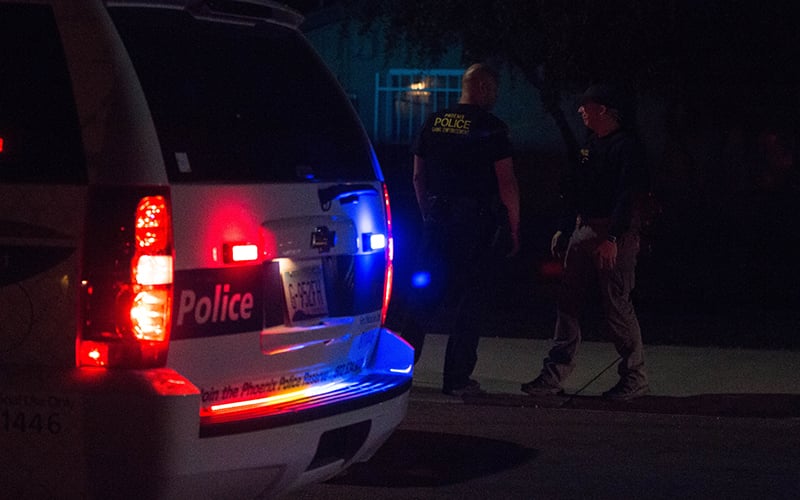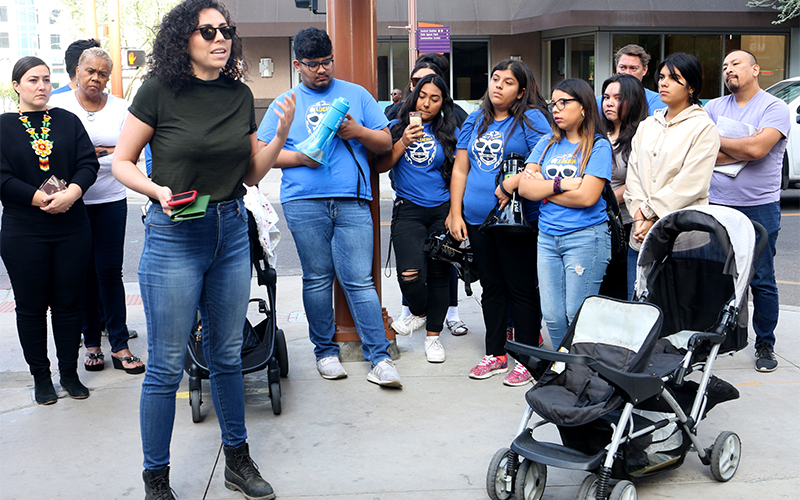WASHINGTON – New data from the Phoenix Police Department show shootings by city officers fell sharply last year, from 44 incidents in 2018 to just 15 in 2019, bringing the city more in line with its average of recent years.
“It kind of fell back to where it normally kind of hovered,” said Justin Nix, an assistant professor of criminology at the University of Nebraska Omaha. He was one of the authors of a National Police Foundation study of the city’s 2018 spike in “officer-involved shootings.”
Although experts and local officials could not point to one specific reason for the drop in 2019, several possible factors were mentioned. Those included better training, more officers on the force, greater use of body cameras, new policies on reporting when officers draw their weapons – even the possibility that were fewer crimes and calls for police to respond to during the year.
“It could be a reduction in crime. It could be a few things,” said Britt London, president of the Phoenix Law Enforcement Association. “I don’t know what it is. But there’s a marked difference, that’s for sure.
“I’m very glad that we have a decline, that means are officers are safer. But we still did have police shootings,” said London, who called it sad any time an officer has to use deadly force.
Some local activists wonder if the drop in shootings could be tied to a drop in calls to police last year from minority residents who have grown distrustful of officers.
“I did notice that with the communities of color, a reduction in the number of incidences,” said Janelle Wood, founder of the Black Mothers Forum.
“I believe there may have been a reduction in us (people of color) calling in, that’s what is concerning me,” she said.
National Police Foundation President Jim Burch pointed to a 2018 Pew Research report that found 61% of the public believes police act unethically some or all of the time. Although public trust in police was still higher than it was for politicians, preachers, journalists and tech company executives, Burch said the level of trust was “not good enough, we need to work harder.”
“They don’t feel like they have the ability to call law enforcement,” Burch said of some communities distrustful of police.
Phoenix police officers averaged 21 shootings a year from 2009 to 2017, with a spike once before, to 31, in 2013. The National Police Foundation study blamed the 2018 jump in incidents on a shortage of officers and a lack of training, an increase in suspects who were armed and a “significant increase” in assaults on officers.
The one-year spike had given Phoenix the highest number of fatal officer-involved shootings in the nation in 2018, according to the National Police Foundation report. But when measured against population and violent crime rates, the report said Phoenix fell to seventh and 12th, respectively, compared with other Arizona police departments.
Despite the 2019 drop, advocates said there is still a need for greater independent oversight of the department. Phoenix is one of the largest cities without an independent police oversight committee, said Ben Loughlin, policy director for Poder in Action, a nonprofit that is pushing for creation of an independent civilian review board.
“Phoenix is extremely behind the curve when it comes to police accountability measures,” Loughlin said. While the push for a board may seem like a response to the 2018 spike in shootings, he said it has actually been a long time in the making.
The City Council is currently considering several proposals for an independent board, with some decision expected this spring. A police department spokesman declined comment on the possibility of a review board, referring questions to the council.
Mayor Kate Gallego last summer appointed a committee that included former officers and community activists like Wood to review department policies. In a statement, Gallego pointed to city efforts to improve “training, particularly as it pertains to mental and behavioral health, technology capabilities, and increased community input” as helping build trust between the police and residents.
London said the department does have civilian members on some of its oversight boards. But he believes the city council will take the next step and set up an independent civilian panel.
“I don’t know exactly what the city is going to end up with, what style of civilian overview,” London said. “We are resigned to the fact that it’s probably going to be different than what we have now.
“If it will better relations with the community and police, if it’s actually helpful, I think that it will be good. We just don’t know what it is yet,” he said. “We are still in talks about it, but it will be here in 2020, I’m sure.”

